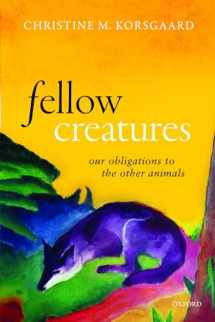
Fellow Creatures: Our Obligations to the Other Animals (Uehiro Series in Practical Ethics)
Book details
Summary
Description
Review
"...this book contributes to a new era for animals, based on yet another firm moral foundation." -- Nathan Nobis, society & animals
"a clear statement by someone who has spent much of her life working on these themes, continually trying to strip away inessential details that might prevent us getting to the heart of the matter" -- Peter Godfrey-Smith, Aeon
"an interesting, well-argued book. It should be read by any philosopher who works on animal ethics." -- Toby Svoboda, Environmental Values
Christine M. Korsgaard presents a compelling new view of humans' moral relationships to the other animals. She defends the claim that we are obligated to treat all sentient beings as what Kant called "ends-in-themselves". Drawing on a theory of the good derived from Aristotle, she offers an explanation of why animals are the sorts of beings for whom things can be good or bad. She then turns to Kant's argument for the value of humanity to show that rationality commits us to claiming the standing of ends-in-ourselves, in two senses. Kant argued that as autonomous beings, we claim to be ends-in-ourselves when we claim the standing to make laws for ourselves and each other. Korsgaard argues that as beings who have a good, we also claim to be ends-in-ourselves when we take the things that are good for us to be good absolutely and so worthy of pursuit. The first claim commits us to joining with other autonomous beings in relations of moral reciprocity. The second claim commits us to
treating the good of every sentient creature as something of absolute importance.
Korsgaard argues that human beings are not more important than the other animals, that our moral nature does not make us superior to the other animals, and that our unique capacities do not make us better off than the other animals. She criticizes the "marginal cases" argument and advances a new view of moral standing as attaching to the atemporal subjects of lives. She criticizes Kant's own view that our duties to animals are indirect, and offers a non-utilitarian account of the relation between pleasure and the good. She also addresses a number of directly practical questions: whether we have the right to eat animals, experiment on them, make them work for us and fight in our wars, and keep them as pets; and how to understand the wrong that we do when we cause a species to go extinct.


We would LOVE it if you could help us and other readers by reviewing the book
Book review



